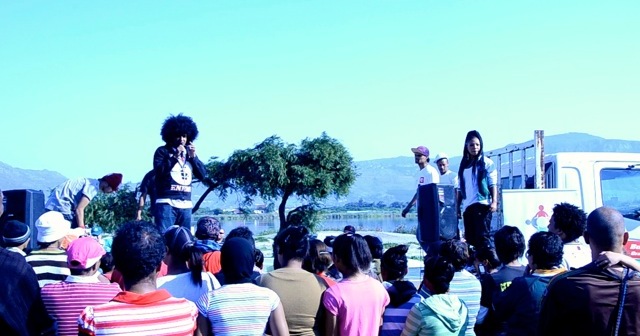The Princess Vlei Wetland on Cape Flats in Cape Town (South Africa) was one of the few natural areas that so called ‘Coloured’, ‘Black’, Khoi and ‘Indian’ people could visit during Apartheid after they were forcibly designated and moved by government to housing estates and ?townships? at the margins of the ?Europeanised? city centre in the 1950s.
The Wetland has been part of a public debate since 2010 when a plan to build a shopping centre at the wetland resurfaced. This matured a civic?led coalition in opposition, which aimed to ecologically rehabilitate the area as a community and heritage park. These activities have come to ?load? Princess Vlei with political content beyond what stakeholder dialogues and other liberal democratic accounting tools can handle. Indeed, Princess Vlei brings a wider lesson about the deep disagreements that urban nature holds in postcolonial societies, and beyond.
A grassroot resistance has built up around Princess Vlei, where a range of protest techniques has been used, from objection letters to public manifestations. Together these have created a rich narrative register that intimately links the values of Princess Vlei far beyond notions like ?storm water retention?, ?improved water quality? or ?animal habitat?. Such place?holders for values or ?ecosystem services? are now common for protecting urban wetlands, but they oftentimes lies within the domains of experts. A telling example of a counter?discourse that brings in new ?experts? and that ruptures linear and simplifying ways of understanding value comes from South African rapper Emile YX? and his young crew of dancers and rappers. Since having first performed at the Vlei they recently released a collection of songs all tuned into struggle. In one they rap: ?They again attend to mall and rape us. From our legacy and common ancestry. Here they plan to concrete away our memory. The enemy, a dictatorship disguised as a democracy, a corporate mockery stealing people’s property. […] Stolen land is what their wealth is built on. That Africa owes them is so damn wrong […] You can bet they struck a deal at the Vlei.? In direct defence of the Wetland, the lyrics melt memories of apartheid geographies with a proud Coloured, Indigenous/Khoisan and deep difference Capetonian urban nature inherently is. Indeed, in a city wrought about through colonial and apartheid planning, history cannot be in singular and put behind us. Rather, Capetonian history wrinkles, curls, and interlaces and becomes part of the present. There is no power that can put these histories in place, or sum them up in a book. They become part of everything, even such mundane things as plants, wetlands and greenery. Could wetlands become sites to ‘dignify spaces’ and ‘correct imbalances’ from the past? Could it destabilize and rupture who could claim to be in the know of urban nature? Could it demonstrate how Capetonian urban nature is also about displacement and forced removal? Could Princess Vlei be part of staging disagreement? Could it tell a much broader and deeper story of a city whose geography and identities are shaped by colonialism and apartheid? These are quite troubling questions for many, but also troubling questions for many of the decision?making processes that are used to organize cities and urban natures in liberal democracies. Often conflicts are taken into participatory processes lead by consultancy firms who dutifully enumerate the ?stakeholders?, note their opinions, and submit a report to the municipality. Maybe an environmental impact assessment is made, and ecosystem services are accounted for. In this case, such a report resulted in December 2011 in that Cape Town?s special committee on land use recommended that the city stop the plans to develop a mall, but at the provincial level this was reverted (1) and Black identity to create a voice that points out how strongly loaded with politics and plans to build the mall went ahead in April 2012. After another two years of inaction, all while grassroots have been mobilizing, the city (finally) decided to stop the shopping mall, possibly influenced by the South African general elections coming up this year.
However, to here draw a line and say that the grassroots won this time and that liberal democratic practices is enough to govern the city, would fail to appreciate the political nature of urban wetlands in postcolonial societies. Whereas to build a shopping mall at Princess Vlei might be about politics. Something which can be ‘handled? by participatory processes and ?stakeholder dialogues?, my point here is that such techniques of governing could also work to silence what Belgian?British geographer Erik Swyngedouw expressed in 2009 as the proper political: ?The [proper]?political? arises when the given order of things is questioned; when those whose voice is only recognized as noise by the police order claim the right to speak, acquire speech. As such, it disrupts the order of being, exposes the constituent antagonisms and voids that constitute the police order and tests the principle of equality.? Indeed, the moment of disrupture, as Erik Swyngedouw implies, is tied to when the ?police order?, or current decision?making procedures, are exposed and challenged. This moves beyond the act of simply giving voice, as in stakeholder dialogues. Rather, the political enters when the established order is disrupted and when, temporarily at least, this rupture reconfigures the order of things so as to format the sounds of the speechless into intelligible speech.
The urban wetland called Princess Vlei, articulated through the practices of activists as part of a postcolonial and post?apartheid society, has become part of staging such a rupture. This calls into question the established ways by which urban ecologies are known and valued, and by whom. It makes impossible the modernistic division between Nature and Society on which scientific fields such as ecology and economy rests, and instead calls for a new arrangement to distribute expertise and giving voice. It insists that to talk about Capetonian urban nature requires a quite troublesome opening of the past to stage those deep disagreements that Cape Town needs. But maybe what it needs, alongside other postcolonial cities are practices that stages disagreements, that makes antagonistic readings of the city and its nature clear and debatable so as to push these deep disagreements into the political process of how the city is governed. Here the urban wetland of Princess Vlei plays a role in the way that such practices are developed, expressed and longed for.
Endnotes
(1) The word ‘Khoi’ signifies one of the indigenous people who dwelled where Cape Town is located.
(2) Erik Swyngedouw draws upon several political philosophers, above all on frenchman Jaques Ranci?re. The publication mentioned here is from Erik Swyngedouw (2009) The Antinomies of the Postpolitical City. IJURR, 33(3), 601?620.
(3) For more information on Princess Vlei and Cape Town, see Henrik Ernstson and Sverker S?rlin (2013), ‘Ecosystem services as technology of globalization: On articulating values in urban nature’, Ecological Economics, 86, pp. 274?284 (Open Access). See also Henrik Ernstson?s websites https://www.rhizomia.net and https://www.situatedecologies.net * Dr. Henrik Ernstson is a postdoctoral scholar at the Department of History, Stanford University, a Visiting Scholar at the African Centre for Cities, University of Cape Town and a Research Fellow (on leave) at KTH Environmental Humanities at the Royal Institute of Technology in Stockholm. He is also editing a volume on Grounding Urban Natures: Histories and Futures of Urban Ecologies (with S S?rlin). (2) (3)



